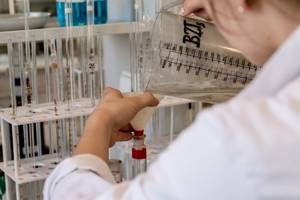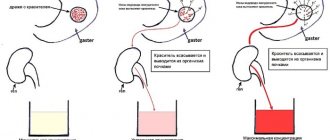Strict diets, balanced nutrition, and regular exercise do not always bring the desired result. It happens that when using the same system, not everyone experiences weight loss results. It is important to use an individual approach when creating a menu. This will not only help you become slim, but also significantly improve your well-being. A blood test diet helps meet the body’s needs and select the optimal combination of nutrients, vitamins, and minerals.
The importance of blood tests for weight loss
Good eating habits, a low-calorie diet and physical activity do not always help you lose weight. Losing weight using a blood test allows you to identify the causes of extra pounds, develop a program for body correction in order to normalize the functioning of systems and organs.
Substances ingested in food do not always cause positive reactions. They can provoke allergies, hormonal imbalance, and lead to intoxication. Research helps identify aggressive elements for menu correction. The method is aimed not only at weight loss, but also at overall health of the body.
Weight increasing hormone. How to tame the hormones that influence weight gain
- Guys, we put our hearts into Bright Side. Thank you for revealing this beauty. Thanks for the inspiration and goosebumps. Join us on Facebook and VKontakte
It's hard to imagine that our weight is controlled not by celery and steamed chicken, but by some invisible chemicals inside us. But it is hormones that give the body the command to accumulate fat or get rid of it.
AdMe.ru - for accurate knowledge about everything in the world, especially if this knowledge helps us become more beautiful and healthier.
Weight is influenced by many factors: lack of exercise, heredity, overeating, stress, but hormones responsible for metabolism (metabolism) play a significant role.
Hormones decide whether to store or burn fat.
Insulin
Cells get energy from glucose. After eating, glucose levels rise and the pancreas secretes insulin. It helps deliver glucose into cells. Figuratively speaking, together with glucose, insulin knocks on the doors of cells. The cells hear the knocking and open, allowing glucose to enter.
Insulin gives us energy, but it also stores and stores fat. If the body has high levels of insulin, fat will be stored.
Cortisol
Cortisol is a stress hormone. It is secreted by the adrenal glands to prevent a drop in blood glucose. This is why stress causes a desire to eat, especially something sweet - this is how the body accumulates strength to withstand difficult situations.
Cortisol lowers your metabolic rate to conserve energy. If the body has high levels of cortisol, fat will be stored.
Leptin
Leptin is a satiety hormone that is produced by fat cells and sends a signal to the brain that “you are full.” It controls your metabolic rate and decides what to do with fat: store it or burn it. If your body has low levels of leptin, you will overeat. Lack of sleep often leads to a drop in leptin levels, which is why it is so important to properly build a daily routine.
Thyroid hormones
Thyroid hormones (T3 and T4) are produced by the thyroid gland and are activators of fat breakdown. The speed of metabolism depends on them. If the body has low levels of thyroid hormones, fat will be stored.
What should you eat and how to train to lose weight?
Research methods
Individual biochemical reactions occurring every second in the body affect not only health indicators. They determine general well-being, mood, and complex regulatory functions. A blood test involves identifying pathological processes that contribute to weight gain.
List of tests:
- A general blood test allows you to determine the level of red blood cells, platelets, and compliance with the hemoglobin standard;
- biochemical research helps to find out the level of cholesterol, glucose, peptide compounds;
- analysis of hormones often becomes decisive; an imbalance in the regulation of the synthesis of substances leads to weight gain;
- a genetic test helps to identify individual characteristics not only for creating a balanced menu, but also for determining the optimal sports that promote rapid weight loss;
- Antibody analysis allows you to determine the level of immunity, identify infections, hidden pathologies;
- Trace element tests are necessary to identify mineral deficiencies or excesses and help diagnose heavy metal intoxication.
Methods of blood testing:
- The level of red blood cells allows you to determine the body's reaction to a particular group of foods. In laboratory conditions, an allergy test is carried out by adding food extracts to the blood. Depending on the erythrocyte sedimentation rate, a list of permitted and prohibited products is formed. Excluding the latter from the diet contributes to the overall health of the body, as well as weight loss.
- In the same way, product groups are determined by the glow of neutrophils, the main type of leukocytes. They are part of the body's immune system, providing protection against viruses and bacteria. The use of this method allows you to identify foods that contribute to weight gain. Menu correction provides relief from many chronic diseases that often accompany obesity.
- The reaction to specific antibodies reveals striking allergic reactions. The method also works comprehensively, helping to identify allergenic foods for optimal diet correction.
Common causes of extra pounds:
- violation of metabolic processes;
- disruptions in the regulation of hormones, hormonal therapy;
- genetic factor.
How to decipher the resulting analysis
Hormones for weight loss
Each hormone has its own normal limits; if the level falls outside of them, this may indicate a malfunction of the internal organs:
- glucose (normal range from 3.89 to 5.83). Blood glucose levels indicate insulin levels. When sugar levels rise, insulin becomes insufficient;
- glycated hemoglobin (normal range from 120 to 140). An increase in its amount occurs with prolonged excess glucose and also indicates insulin deficiency;
- insulin (normal range from 3.9 to 6.4). Its deficiency may be a marker for the development of diabetes;
- leptin (from 3.6 to 10.9). Its deficiency leads to a constant feeling of hunger and the inability to be satisfied;
- thyroid hormones (from 0.4 to 4.05). A deficiency or excess of such hormones indicates a malfunction of the thyroid gland.

Thyroid hormones
Rules for taking a blood test
To determine the optimal diet and exclude foods that stimulate weight gain, you need to undergo an examination. Consultation with a therapist, gastroenterologist, neurologist, and endocrinologist is necessary. The patient's medical history is analyzed and chronic diseases are identified.
A blood test for a diet, as with a routine examination, is given according to the same protocol. To obtain objective data, you must adhere to certain rules:
- Blood sampling is carried out on an empty stomach until 10 am; before the procedure you need to refrain from eating food for 10-12 hours;
- one day before the examination, you should not drink alcoholic beverages, coffee, and you should refrain from smoking;
- intense physical activity, sports, and sexual contacts are excluded;
- 72 hours before donating blood, you need to stop taking medications that affect the clotting process;
- Also prohibited are fatty, hot, spicy foods, animal proteins - dairy products, eggs, meat;
- hormonal characteristics are taken into account; in women, blood sampling for prolactin is carried out on days 3-5 of the cycle, testosterone - on days 8-10, progesterone - on days 20-22.

Diet selection based on blood test
After passing the tests and comprehensive research, a list of green and red products is formed. The first indicates all the ingredients allowed on the menu, including oils and spices. The red list includes a prohibited group that worsens health indicators and therefore affects weight gain. There is also a yellow list, but it is rarely provided to patients, since the products on it are also undesirable for consumption.
The menu is formed individually, taking into account both lists, but there are general rules for the hemocode:
- components of the green list alternate; after eating an approved product, you can include it in the diet only after 4 days;
- processing methods popular in nutrition are used; if the product cannot be consumed raw, it is baked, stewed or boiled;
- based on the principles of fractional nutrition, the daily volume is divided into 5-6 meals;
- daily caloric intake is determined individually, taking into account the patient’s gender, age, activity level, the patient should not feel hungry;
- the menu is formed from 70-80 permitted products, about 20 items are on the red list, 40 are on the yellow, undesirable list;
- last meal no later than 3 hours before bedtime;
- physical activity is not excluded; daily caloric intake provides a sufficient amount of energy for an active lifestyle.
A blood test for weight loss products will have to be carried out more than once. So, a blood draw done after 2 weeks can transfer some items from the red list to the green list. The cytotoxic reaction of the cell, which underlies the popular diet, is influenced by a number of factors. Stress and various diseases change biochemical parameters. Therefore, you should not consider the nutrition system a universal way to lose weight.
A decrease in body weight also occurs due to the normalization of the daily routine, split meals, and the exclusion of high-calorie foods. The green list, despite the individual approach, does not include confectionery, sausages, or alcohol. The diet is formed from the nutrients of a balanced diet - fruits, vegetables, cereals, meat, seafood.
What hormones to take to lose weight. What is the hormone leptin
To lose excess weight, various weight loss hormones can be used. Among them there is one that is responsible for the feeling of satiety - this is the hormone leptin, how to get rid of excess weight if its excess or deficiency in the body interferes with weight loss.

Hormones for weight loss
Leptin is produced by fat cells.
Violation of its normal indicators affects the body in two ways:
- a person constantly wants to eat. When there is an excess or deficiency of leptin, signals are not sent to the brain that the body is full or not. Therefore, there is constant hunger, which is why a person overeats, gains weight, fat cells grow, and the feeling of satiety does not occur;
- a person is always full. In this case, the body is sensitive to leptin, so the person eats little food and loses weight.
Leptin performs a number of important functions:
- at normal levels, the feeling of hunger decreases;
- takes part in metabolism;
- increases thermogenesis (fat burning process);
- promotes energy consumption.
Important! Before you start a diet and exercise, you should test your body for sensitivity to leptin.
To normalize leptin levels and to lose excess weight, you need to stick to a diet.
Its basic rules:
- eat more protein and limit carbohydrates;
- increase the amount of vegetables, fruits, cereals, berries, nuts, and whole grain bread in your diet;
- reduce fructose intake;
- exclude simple carbohydrates (sugar, confectionery, jams, etc.);
- You can't strictly limit calories. The body may perceive this as starvation and hormonal disruption will occur;
- do not overeat before going to bed;
- reduce the amount of foods that contain a lot of animal fat.
Leptin does not exist in tablets or injections. However, the market offers products that are similar to it in their effects on the body: teas, coffee, cocoa, etc.
Contraindications
The universal diet has no restrictions on its use. Thanks to a comprehensive survey, lists of prohibited and permitted products are formed. Unlike mono-diets, the menu is not limited to a few items, providing the body’s nutritional needs.
The popular nutrition system is aimed at weight correction, health improvement and rejuvenation. Thanks to its use, it is possible to get rid of diseases that, at first glance, are not associated with excess weight. Hemocode includes the principles of balanced nutrition, the basics of health and longevity.











